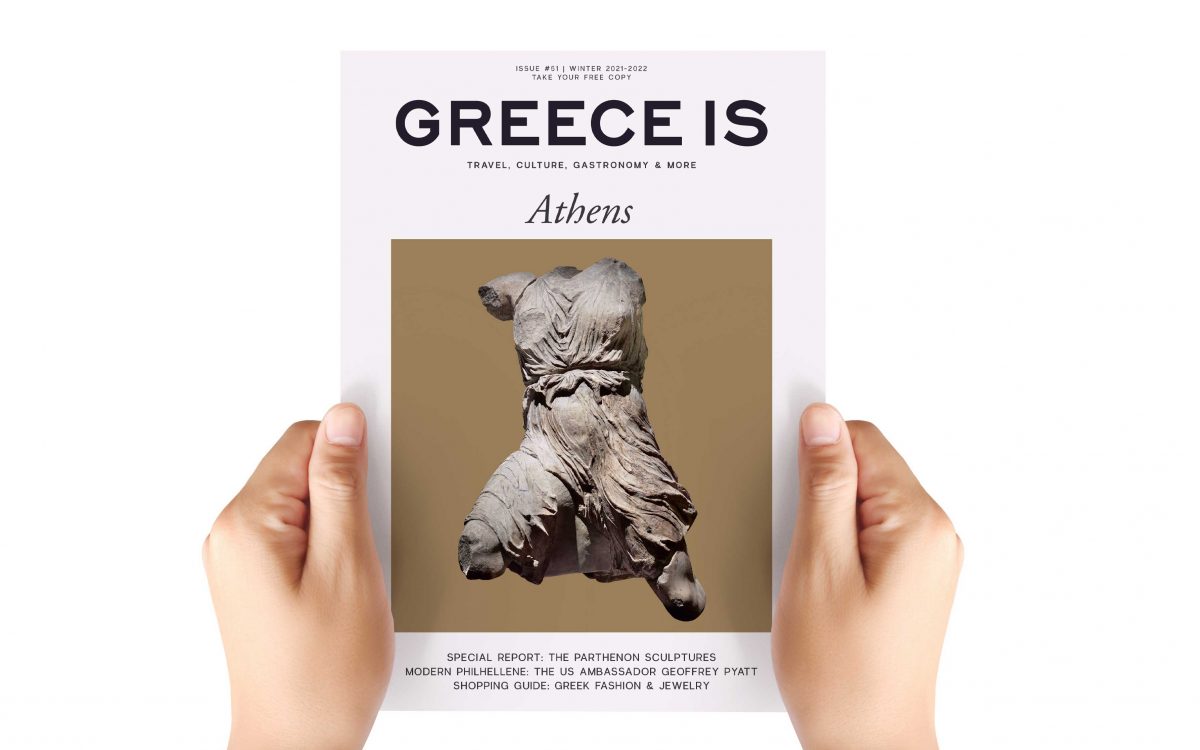Our latest issue, Greece Is Athens Winter 2021-2022 will be available this weekend (18-19/12) together with the New York Times International Edition – Kathimerini English Edition wherever international press is sold in Greece.
But even if you are not able to get your hands on a copy in shops, the magazine will also be available in digital format on our homepage, and available to order for free through our e-shop! (All past issues of our magazines can be delivered to anywhere in the world at only the cost of postage and packaging.)
In this issue dedicated to our capital, we share a look at the Athens of right now; a city that’s still held back by Covid-19 restrictions, but gleaming with creativity and ambition, and humming with anticipation for the return to the lively urban pace that suits it so well.
Over 159 pages, we give our best tips on where to dine, shop, and hang out now; present our cultural agenda for the end of 2021 through 2022; guide you to the Neos Kosmos neighborhood and to Ardittos Hill; discuss life in Athens with US Ambassador to Greece, Geoffrey Pyatt; go on a hunt for the city’s best souvlaki; and take a special look at a subject that’s currently on everyone’s mind: the Parthenon Marbles. This, and much more.
To further introduce Greece Is Athens Winter 2021-2022, below is the letter from our Deputy Editor, Natasha Blatsiou:

© FROM THE BOOK: THE REUNIFICATION OF THE PARTHENON SCULPTURES, EDITED BY THE HELLENIC MINISTRY OF CULTURE AND THE MELINA MERKOURI FOUNDATION; PRODUCTION BY KAPON EDITIONS, ATHENS 2003 (2nd EDITION)
What is Normal?
By Natasha Blatsiou, Deputy Editor, Greece Is
I’m tired of reading about the “new normal,” about how the pandemic is an opportunity to fix humanity and change our way of living, and I don’t want to see any more lists on how to adapt to social distancing, either.
Why? Because I think normal isn’t about surviving, it’s about living. For me, “normal” means doing all the small things that scare us now: exploring new places and traveling without trepidation; having a long, relaxing breakfast in the busy dining room of a city hotel or a country inn; enjoying a meal, out or at home, at a large table packed full of friends; or sitting down in a cozy café or a loud bar with someone we love. For us Greeks, who are known for our intimate exuberance – we hug, kiss, dance, eat from the same plate, walk arm in arm, form large groups of friends – the need to resume physical contact is extremely powerful. As Greeks, we’re at our best when we’re free to come together.
This issue of Greece Is – Athens is dedicated to this need to get back wholly to our lives, but there is another key aspect to the return to normalcy for the Greek capital that has been missing for more than two centuries: the Parthenon sculptures. Today, only half of the ancient citadel’s sculptural elements are in the Acropolis Museum, looking out at the Sacred Rock – the rest are in the British Museum in London, cut off from what was once an organic whole, a symbol torn asunder long ago and still disjoined today. An in-depth look at the subject, the result of extensive research conducted by the Greece Is team’s archaeologist, Duncan Howitt-Marshall, sums up everything you need to know about this unique monument to human achievement and aspiration, its turbulent history, how intrinsic parts of it were snatched away, and what you can do to support the demand for their return.
In 1983, Greece’s Minister of Culture Melina Mercouri petitioned for the re- turn of the Parthenon Sculptures under the rallying cry “I want my Marbles back.” Since then, many other efforts, Greek and international, have followed. This past November, the Greek Prime Minister Kyriakos Mitsotakis, during his first official visit to 10 Downing Street, repeated the desire of the Greek state and its people, explaining to his counterpart, Boris Johnson, that reuniting the Sculptures was a moral as well as a political necessity. After all, in the end, what’s normal is being back together again.












